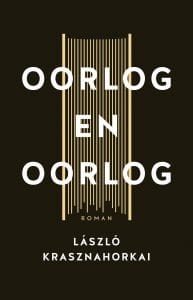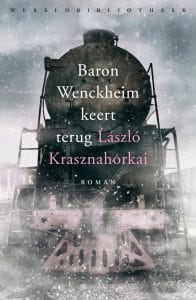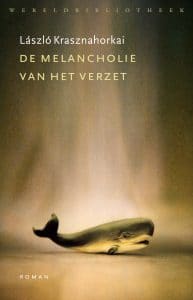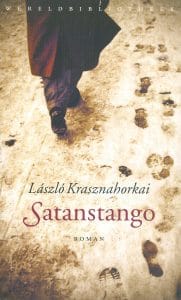Grote internationale erkenning ten spijt, vindt de Hongaarse schrijver László Krasznahorkai zelf elke roman mislukt. ‘Ik span mijn hersens in tot het uiterste in, maar het wordt nooit het boek dat het zou moeten zijn. Dus begin ik weer opnieuw. En opnieuw.’
Hoop op verlossing die teloorgaat
Verfilmingen van zijn romans en het winnen van de prestigieuze Man Booker International Prize met Satanstango (1985) gaven de Hongaarse schrijver László Krasznahorkai (68) internationale bekendheid. Sindsdien worden zijn boeken meer en meer vertaald. Oorlog en oorlog, de roman die onlangs in Nederlandse vertaling verscheen, publiceerde hij in zijn vaderland al in 1999. Het is een typische Krasznahorkai: een boek over hoop op verlossing die teloorgaat, verpakt in lange, meanderende zinnen; even knap geschreven als het is vertaald door Mari Alföldy.
 Archivaris György Korin, woonachtig in een klein provinciestadje, komt halverwege zijn leven tot de conclusie dat hij niets waard is. Hij heeft niets tot stand gebracht; weliswaar heeft hij niemand kwaad gedaan, maar hij heeft ook niets ten goede toegevoegd aan de wereld.
Archivaris György Korin, woonachtig in een klein provinciestadje, komt halverwege zijn leven tot de conclusie dat hij niets waard is. Hij heeft niets tot stand gebracht; weliswaar heeft hij niemand kwaad gedaan, maar hij heeft ook niets ten goede toegevoegd aan de wereld.
Vlak nadat hij besluit dan maar een einde aan zijn nutteloze leven te maken, ontdekt hij in het archief een manuscript dat tussen twee planken was gevallen en daarom nooit in het systeem was geregistreerd. De tekst gaat over vier engelen die op zoek zijn naar vrede in de verschillende krochten van de wereldgeschiedenis, maar overal alleen maar oorlog en oorlog aantreffen. Korin vindt het een meesterwerk, een boek dat de wereld zal veranderen. Hij besluit daarom, alvorens een einde aan zijn leven te maken, dit werk voor de volgende generaties te bewaren en heeft gehoord van internet, dat alles onverwoestbaar zou bewaren voor de eeuwigheid. Hij reist af naar New York, in zijn ogen het centrum van de wereld, om het manuscript openbaar te maken.
Vier versies van één roman
Uw romans Satanstango (1985), De melancholie van verzet (1989), Oorlog en oorlog (1999) en Baron Wenckheim keert terug (2016) worden een vierluik genoemd. Ziet u dat zelf ook zo?
‘Vanuit het perspectief van een uitgever is het inderdaad eenvoudiger om het zo te noemen, maar in werkelijkheid zijn die vier romans vier verschillende versies van één enkele roman. Ik schrijf altijd hetzelfde. Dezelfde figuren, dezelfde levensverhalen, dezelfde condities. Wat nieuw lijkt, is slechts een hernieuwde poging tot hetzelfde en het falen daarvan. Daarom is de literatuurgeschiedenis zo ironisch en triest tegelijk. Sinds Homerus en de Bijbel zijn er geen nieuwe verhalen onder de zon of de maan.
 De helden van mijn boeken weten – diep van binnen weten wij het allemaal – dat hun één enkel verhaal is toevertrouwd, en dat ze dat zouden moeten realiseren of tot uitdrukking moeten brengen.
De helden van mijn boeken weten – diep van binnen weten wij het allemaal – dat hun één enkel verhaal is toevertrouwd, en dat ze dat zouden moeten realiseren of tot uitdrukking moeten brengen.
Hun verhalen – onze verhalen! – volgen uit het karakter van de mens, en aangezien de mens wat zijn essentie betreft niet verandert, kunnen zij onmogelijk iets nieuws vertellen. Maar diep in zijn hart draagt elk personage, net als wij allemaal, iets raadselachtigs in zich. Dat is wat iedereen wil weten: wat dat raadsel in ons is.
Kunst probeert het geheim van de menselijke ziel tot uitdrukking brengen, antwoord te vinden op de vraag waartoe de mens bestemd is. Daarom nemen we boeken ter hand, kijken we naar schilderijen, beelden en theater, daarom luisteren we naar muziek. Maar het raadsel laat zich niet oplossen. Ook ik kan het raadsel niet oplossen, alleen aangeven dat het bestaat. Daarom ervaar ik mijn werken als mislukt. En daarom kan ik niet stoppen met boeken schrijven, dus mijn helden in de werkelijkheid zetten: omdat ik me, net als mijn personages, niet kan bevrijden van de drang om het nog eens en nog eens te proberen.’
Stemmen in het hoofd
U vertelde ooit dat uw personages bij u aankloppen om te mogen bestaan, en dat het uw taak is om naar ze te luisteren. Hoe en wanneer meldde György Korin zich?
‘Dat was op de Kurfürstendamm in Berlijn, ’s nachts, aan het begin van de jaren negentig. Alles was uitgestorven, het was een uur of drie ’s nachts, de verlichte etalages schitterden gruwelijk, ze leken in brand te staan. Opeens begon mijn hart harder te kloppen en hoorde ik een onbekende stem in mijn hoofd spreken, die van György Korin. Hij praatte maar door, ik kon niet stoppen met naar hem te luisteren, ik kon alleen nog maar naar hém luisteren, en dit betekende dat iemand via mij onze werkelijkheid wilde binnenkomen.
Een hele tijd hoorde ik twee opeenvolgende zinnen heel scherp: het eerste was: “Het maakt me niet meer uit als ik doodga.” Vervolgens zag ik een figuur die op een brug stond, omringd door kinderen, en ergens naar wees, terwijl hij zei: “Zijn dat zwanen?” Dit ontroerde me zo, die twee zinnen samen, het was zo mooi dat het alles besliste.
De kracht van de zinnen is verbijsterend, maar ze zijn niet van mij afkomstig. Ik deed niets anders dan naar mijn beste kunnen zijn op elkaar botsende, zich opeenstapelende lavastroom van woorden opschrijven. De figuren van mijn romans willen dringend iets vertellen. We gaan met een ijzingwekkende snelheid door hun levensverhaal. Stilstaan is hier niet mogelijk, hier passen alleen komma’s, geen punten.’
We zijn als bomen
Uw romans zijn gesitueerd in de omgeving van uw jeugd. Welke invloed heeft die omgeving op u gehad?
‘Ik ben opgegroeid in een burgerlijke familie in Guyla, in het zuidoosten van Hongarije. Toen ik negentien was, deed mijn moeder een zelfmoordpoging. Daarna stapte ik uit mijn familie, ik verliet die mensen en ging leven onder de meest uitgebuite mensen, want ik was verontwaardigd dat ze juist in naam van het communisme werden uitgebuit. De communisten zeiden tegen hen: jullie hebben de macht, maar zij, de zogenaamde gewone mensen, hadden helemaal niets, laat staan macht. Ik leefde jarenlang onder hen.

Maar ook al ben ik de wereld in getrokken, in werkelijkheid ben ik geen millimeter van verwijderd geraakt van de omgeving van mijn jeugd. Dat is geen kwestie van willen, het komt doordat we als bomen zijn: we blijven waar we worden geboren. Bij mijn huis in Hongarije staat een honderden jaren oude reus, maar ik kan er niet lang naar kijken: ik voel diep de pijn die hij moet voelen omdat hij daar maar staat – hij zou graag ergens anders willen zijn, maar dat is onmogelijk.’
Een bruine zon
Hoe kwam uw tot het schrijven van uw eerste roman, Satanstango?
‘Ik heb nooit het plan gehad om schrijver te worden. Ik wilde niets worden. Tijdens mijn zwervende bestaan tijdens het communisme, deed ik allerlei soorten eenvoudig werk. Zo was ik eens nachtwaker bij een koeienstal en woonde ik op een boerderij.
Toen ik een keer ’s ochtends thuiskwam van mijn werk, zei de boer dat ik nog niet naar bed moest gaan, want Irimiás zou komen van één van de naburige boerderijen om de biggen te castreren. Ik moest ze bij hun voorpoten pakken, de boer hield hun achterpoten vast, en Irimiás, een lange, magere man met een angstaanjagend gezicht die zijn lange jas naar achteren gooide en neerknielde voor de achterpoten van de biggen, sneed met een scalpel doodstil de ballen van de gillende dieren weg.
Ik kon het niet aanhoren en niet aanzien, dus ik keek omhoog naar het bovenste punt van het dak van het huis op het erf. Toen kwam de zon op boven het dak. En die zon was bruin. Op dat moment besloot ik een boek te gaan schrijven. En dat werd Satanstango.

Meer dat dat wilde ik niet schrijven, maar ik wist niet dat je daar niet zomaar aan kon beginnen: je komt op een hellend vlak terecht en je kunt niet stoppen, je gaat steeds verder omlaag. Ik span mijn hersens in tot het uiterste in, maar het wordt nooit het boek dat het zou moeten zijn. Dus begin ik weer opnieuw. En opnieuw. Een nieuwe roman, een nieuw fiasco. Oorlog en oorlog. Zo gaat dat. Ik ben een strompelende uitgediende soldaat van een genre dat zijn kracht heeft verloren. Dus ik hoop dat ik op tijd doodga voordat ik helemaal gek word. Op mijn grafsteen zal staan: L. Basta. In het Hongaars, fonologisch geschreven als Elbaszta, betekent dat: hij heeft het verkloot.’
László Krasznahorkai, Oorlog en oorlog, vertaald door Mari Alföldy, 368 p., Wereldbibliotheek.
